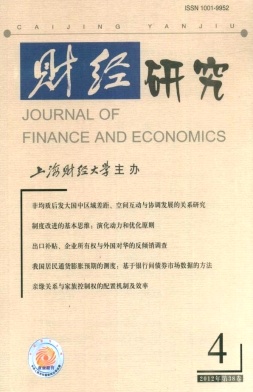出口补贴、企业所有权与外国对华的反倾销调查——基于Poisson模型的理论和实证分析
财经研究 2012 年 第 38 卷第 04 期, 页码:27 - 38
摘要
参考文献
摘要
文章以中国出口导向型经济实践为基础,通过理论建模确立了五个理论假说,它们分别阐明了出口补贴、企业所有权、贸易报复威胁以及WTO贸易制度与外国对华反倾销风险之间的关联性。文章还采用Poisson模型的GEE、FE和RE回归方法,估计了印度、美国、欧盟、阿根廷、土耳其、巴西、南非和澳大利亚等8个国家和地区1995-2009年对华反倾销调查的面板数据,从经验上验证了外国对华反倾销调查的数量与中国的出口退税和对外反倾销调查强度成正比,与外资控制在华出口企业所有权的强度成反比。
[1]沈国兵.美国对中国反倾销的宏观决定因素及其影响效应[J].世界经济,2007,(11):11-23.
[2]谢建国.经济影响、政治分歧与制度摩擦:美国对华贸易反倾销实证研究[J].管理世界,2006,(12):8-17.
[3]杨艳红.WTO制度、贸易不对称与国外对华反倾销——部分国家和地区对华反倾销调查的实证分析[J].数量经济技术经济研究,2009,(2):102-111.
[4]Antràs P.Incomplete contracts and the product cycle[J].American Economic Review,2005,95(4):1054-1073.
[5]Antràs P,Helpman E.Global sourcing[J].Journal of Political Economy,2004,112(3):552-580.
[6]Bhagwati J,Ramaswami V K.Domestic distortions,tariffs and the theory of the opti-mum subsidy[J].Journal of Political Economy,1963,71:44-50.
[7]Blonigen B A,Bown C P.Antidumping and retaliation threats[J].Journal of Interna-tional Economics,2003,60:249-273.
[8]Bown C P.Antidumping against the backdrop of disputes in the GATT/WTO system[R].Manuscript,Brandeis University,2001.
[9]Bown C P.Global antidumping database[R].World Bank,2010.
[10]Brander J,Spencer B.Tariffs and the extraction of foreign monopoly rent under poten-tial entry[J].Canadian Journal of Economics,1981,14:371-389.
[11]Brander J,Krugman P.A‘reciprocal dumping’model of international trade[J].Jour-nal of International Economics,1983,15(3-4):313-321.
[12]Chu T,Prusa T J.The reasons for and the Impact of antidumping protection:The caseof People’s Republic of China[R].Economics Study Area Working Papers,2004.
[13]Knetter M M,Prusa T J.Macroeconomic factors and antidumping filings:Evidencefrom four countries[J].Journal of International Economics,2003,61(1):1-17.
[14]Prusa T J.Antidumping law and firm behavior[R].Mimeo,1987.
[15]Pursa T J.On the spread and impact of Anti-dumping[J].Canadian Journal of Eco-nomics,2001,34(3):591-611.
[2]谢建国.经济影响、政治分歧与制度摩擦:美国对华贸易反倾销实证研究[J].管理世界,2006,(12):8-17.
[3]杨艳红.WTO制度、贸易不对称与国外对华反倾销——部分国家和地区对华反倾销调查的实证分析[J].数量经济技术经济研究,2009,(2):102-111.
[4]Antràs P.Incomplete contracts and the product cycle[J].American Economic Review,2005,95(4):1054-1073.
[5]Antràs P,Helpman E.Global sourcing[J].Journal of Political Economy,2004,112(3):552-580.
[6]Bhagwati J,Ramaswami V K.Domestic distortions,tariffs and the theory of the opti-mum subsidy[J].Journal of Political Economy,1963,71:44-50.
[7]Blonigen B A,Bown C P.Antidumping and retaliation threats[J].Journal of Interna-tional Economics,2003,60:249-273.
[8]Bown C P.Antidumping against the backdrop of disputes in the GATT/WTO system[R].Manuscript,Brandeis University,2001.
[9]Bown C P.Global antidumping database[R].World Bank,2010.
[10]Brander J,Spencer B.Tariffs and the extraction of foreign monopoly rent under poten-tial entry[J].Canadian Journal of Economics,1981,14:371-389.
[11]Brander J,Krugman P.A‘reciprocal dumping’model of international trade[J].Jour-nal of International Economics,1983,15(3-4):313-321.
[12]Chu T,Prusa T J.The reasons for and the Impact of antidumping protection:The caseof People’s Republic of China[R].Economics Study Area Working Papers,2004.
[13]Knetter M M,Prusa T J.Macroeconomic factors and antidumping filings:Evidencefrom four countries[J].Journal of International Economics,2003,61(1):1-17.
[14]Prusa T J.Antidumping law and firm behavior[R].Mimeo,1987.
[15]Pursa T J.On the spread and impact of Anti-dumping[J].Canadian Journal of Eco-nomics,2001,34(3):591-611.
引用本文
王根蓓. 出口补贴、企业所有权与外国对华的反倾销调查——基于Poisson模型的理论和实证分析[J]. 财经研究, 2012, 38(4): 27–38.
导出参考文献,格式为:





 8948
8948  6018
6018

